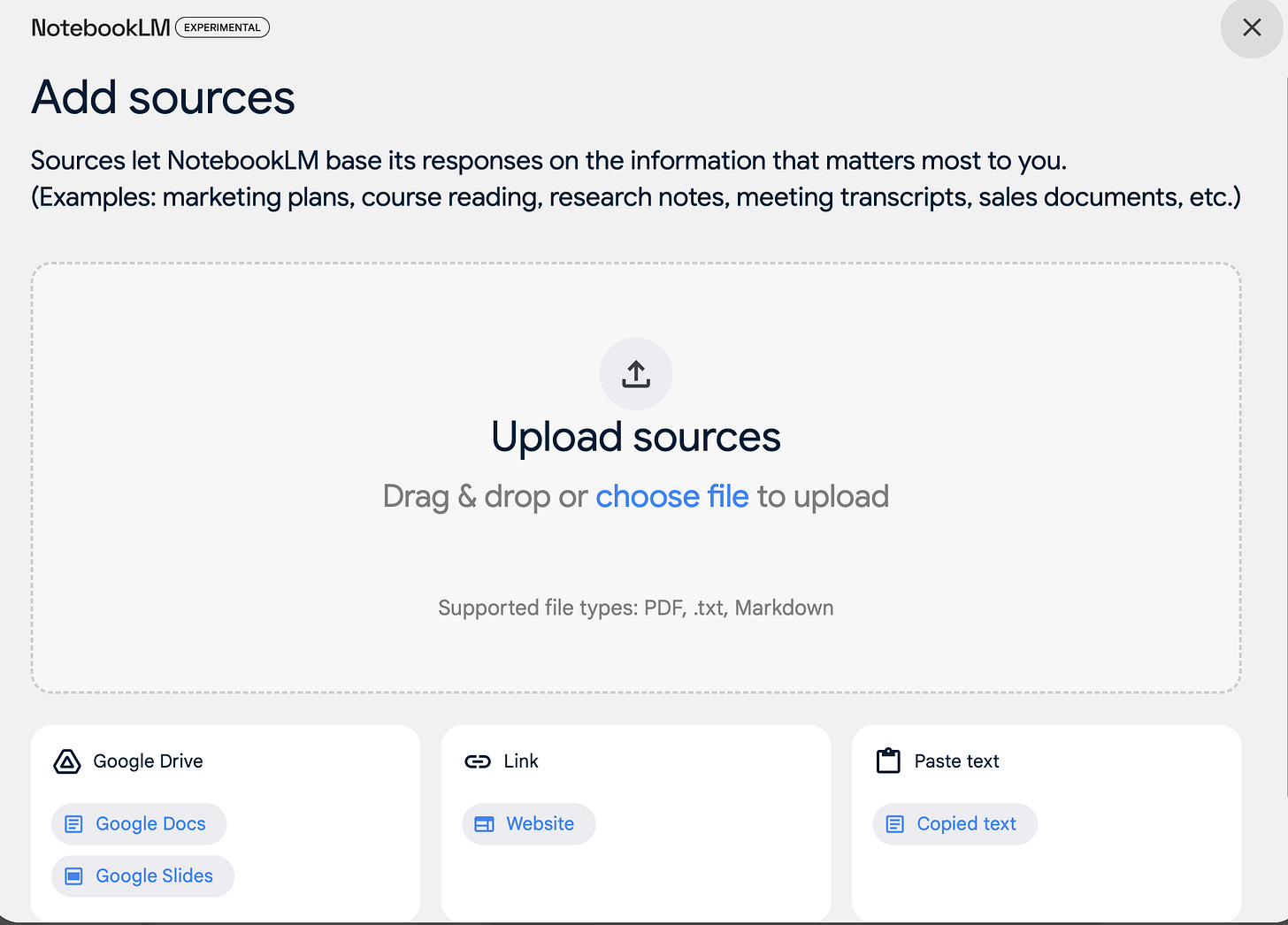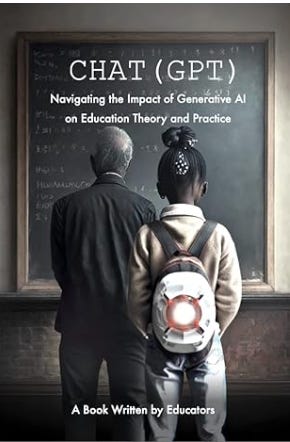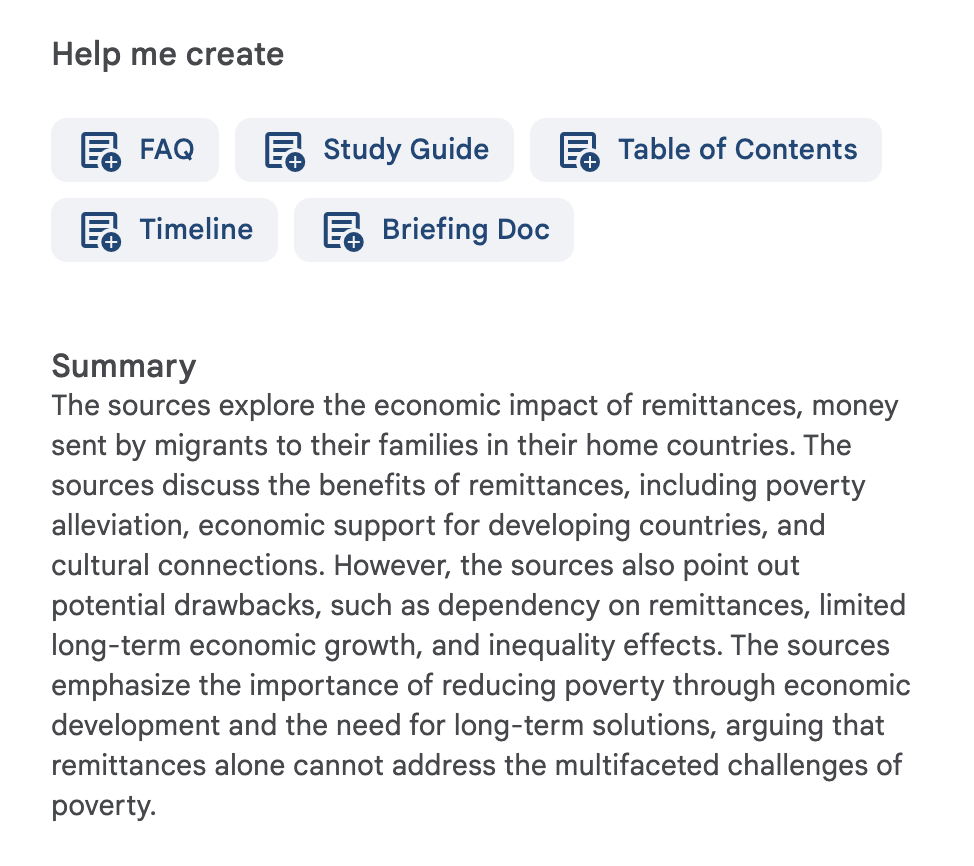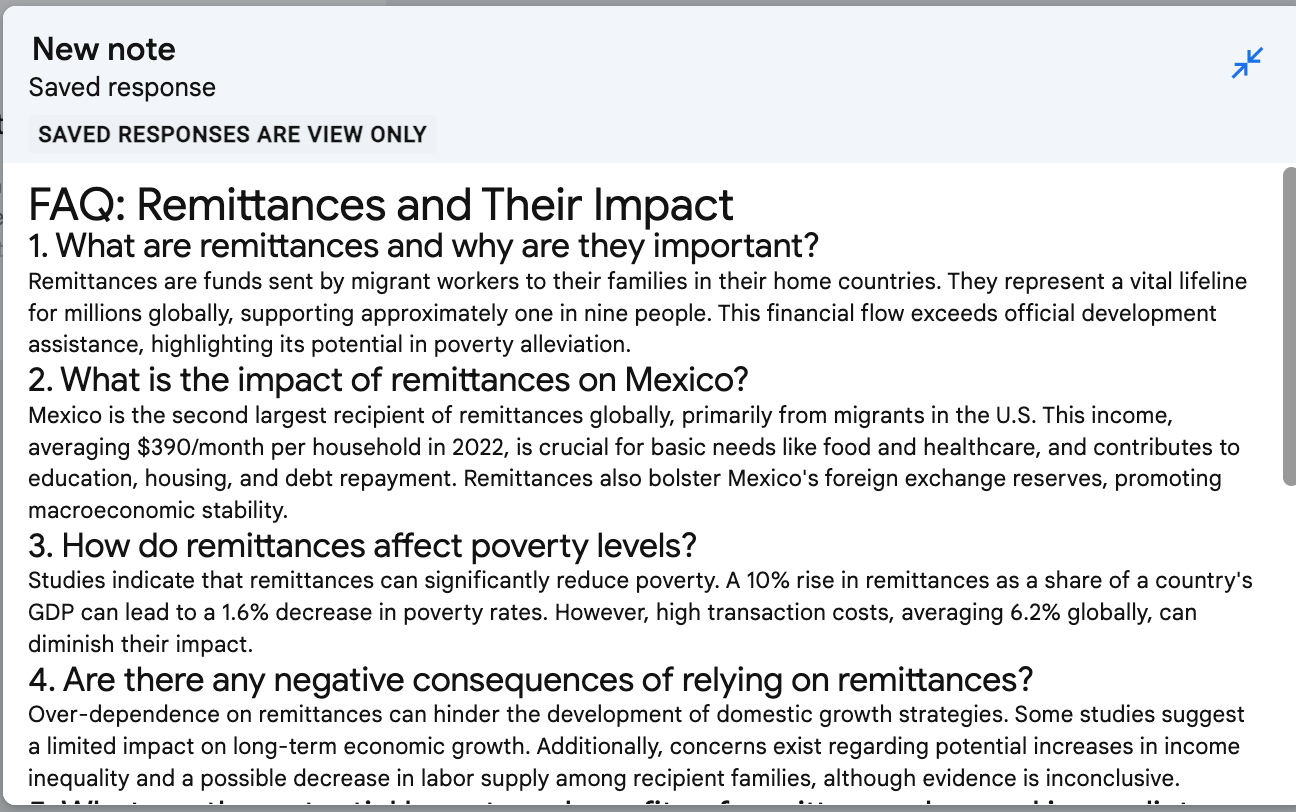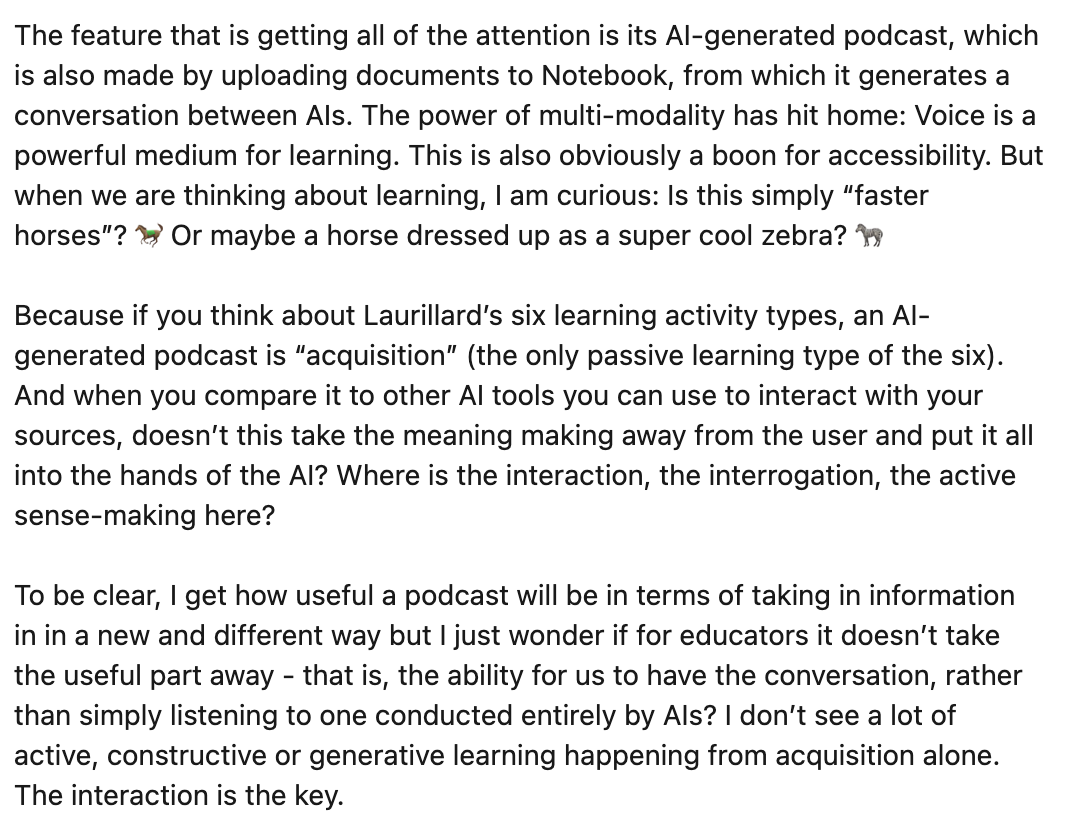I created 25 Podcasts over the weekend with NotebookLM and no employees, and I did a few other things
What I learned, how I think these should be best used, and where I think this is all heading
Google’s NotebookLM podcasting tech is amazing and easy to use. It could be the first “application layer GPT moment” for educators.
This should just be one step of instruction, and I created so many podcasts to enable that.
The next steps will be replication in the podcaster’s voice, translation, video avatars, and even immersion.
Reflections on the tech and educational/societal implications
Last week, Google released a podcast feature (“Audio Overview”) on NotebookLM, which came out last spring, that allows individuals to create a Podcast that is a dialogue between two individuals. I heard one that sounded interesting, so I thought I’d check it out.
In the rest of this post, I’ll describe what I did for each one and what I learned.
(#1) I started by uploading an essay (the podcasts are produced from the content that is uploaded), I wrote to help debaters understand the basic arguments on their debate topic (border surveillance). All that I did was upload the document.
Note that you cannot upload Microsoft Word documents. You have to upload Google Docs or PDFs (haha)), but most people can easily convert a Word document to a PDF.
I did not enter a single prompt. I just clicked “generate.”
It created an amazing podcast that I shared.
(#2) I tried creating a second one on a debate topic students are using in China — generative AI in education. For this one, I uploaded a presentation I gave on the topic that I made in beautiful.ai, some articles on the issue, and some research I’ve done on the topic. Bing. Another great podcast. Although the students are competing in an English-speaking debate league, I used another AI to convert it to Mandarin Chinese in case it would help them understand it better.
Once I did the Mandarin conversion, I converted #1 to Spanish because some students in the US are native Spanish speakers and are learning how to speak in English.
The previous ones were all done with some short, defined documents, so I thought I’d try some larger documents.
(#3). I uploaded our book Humanity Amplified, which is approximately 180,000 words/250,000 tokens. I was stunned; it hit all the central themes of the book engagingly.
One thing I’ve noticed is that when people use basic AI summarizing tools to summarize their work, they are very impressed with how well AI does. This lesson certainly applies in this case.
(#4) I tried creating a “debate good” podcast by uploading everything I’d ever written on the value of debate, plus several other documents, including a lot of recent long work on the value of debate in an AI World.
I did not like how this podcast turned out because it was too AI-heavy. I did otherwise like it, however, so I kept it and decided to create a separate on the non-AI world benefits of debate (below). I think this is probably the best podcast it created.
The lesson this taught me was that I need to focus on the totality of documents that I upload to the system if I want the podcast to focus on a particular area, as there is no way to otherwise direct the podcast (see below).
#s 5-23
I created additional podcasts on some arguments students are debating, with a particular emphasis (for now) on the surveillance topic. These include (5) AI good/bad (general), (6) the general workability of border surveillance, (7) border disease surveillance, (8) firearm trafficking across the border, (9) fentanyl trafficking, (10) surveillance pushing individuals along more dangerous routes, (11) immigration restrictions and US agriculture, (12) immigration restrictions and the US economy (13) immigration restrictions and US-Mexico relations, (14) border surveillance as structural violence, (15) the global spread of surveillance tech, (16) the impact of border surveillance on trade, (17) data overload, tracking, (18) counterfeit products, (19) border guard corruption, (20) cyber security trade-off, remittances, (21) human trafficking, (#22), humanitarian considerations, and (#23) “court clog”
(#24) I also uploaded the first book I co-edited on generative AI in the spring of 2023. I thought it did a pretty good job hitting some of the major highlights of the 30+ author volume, including sample uses of AI in the classroom, needed changes in assessment, cyborg skills, the Design39 example, bias, how quickly changes are coming/here, the importance of experimentation, and how we need to actively shape its role in education and society.
(#25) I also created one on our AI Guidance report.
I think this one was pretty good. It does say only 12 states have issued guidance but that is because we haven’t updated it since July, and it jumps from debate to co-intelligence, but I think it does a pretty good job of hitting the highlights, though I could have done better. It did a much better job with Humanity Amplified.
(#4 :)) I finished my general “Debate Good” podcast. One of the things I noticed with this one is that when the podcasters reference sources they refer to the file names of the document(s) you upload, so if you want the podcasters to reference specific documents, make sure the titles are in the file names you save.
It’s Not Just the Podcasts
Of course, it’s not just podcasts. I can create Study Guides, FAQs, and Briefings.
My Reactions to the Tech
(1) The components are not that shocking. I’ve been arguing since the spring of 2023 that conversational voice technologies, such as those developed by hume.ai and are being integrated into call centers (bland.ai) would soon make their way into teaching/tutoring systems to engage students.
Also, approximately 6 months ago, Google started rolling out 1 million+ character context windows, which is what allowed me to upload a large number of documents and entire books to create podcasts on.
(2) The application layer is critical and amazing. For many people, the release of ChatGPT 3.5 in late 2022 served as a watershed moment in artificial intelligence, opening their eyes to the rapid advancements in language models and generative AI. This "aha" moment caught many off guard, especially those who hadn't been closely following AI developments.
For others, different AI breakthroughs have served as eye-openers for various groups. For instance, the progress in autonomous vehicles has been equally astounding for others. Driverless cars are now covering impressive distances, logging around 100,000 miles per week on public roads.
Now, Google's NotebookLM and its new Audio Overview feature may be poised to create a similar "aha" moment, particularly for educators and those in the field of knowledge dissemination. Every educator and friend I have shared this with over the weekend has been “blown away” by the technology after trying it on a few of their own documents.
Buy this isn’t just about it being an “aha” moment. It also demonstrates that we are just at the beginning stages of this, and as companies take the developments and apply them/create applications with them, we will see more and more societal transformation.
As Jeffrey Ding points out in his new book, it is creating applications/products that will determine adoption and productivity gains on a large scale.
(3) Data organization is critical. A lot is written about how companies need to get their data organized for AI to work well. In this simple case, what took me the longest this weekend was making sure I had the debate research organized in a way that the AI could train it to produce the podcasts. If I had all my debate arguments organized on my computer, I could batch-process thousands of podcasts, covering the basics of anything anyone could debate.
(4) It’s not hard to add more and what’s coming next. All of the following could be easily added
Podcasts that are longer than approximately 7-15 minutes (the max it generated)
An option for prompting to direct the podcast content
A way to text edit the podcast transcript
Easy language translation (I had to use another service)
Voice cloning so I could just clone at least my voice (plus, perhaps someone I work with) so the podcast could be seen as from me/us rather than the same two individuals all the time (which does get a bit annoying to listen to).
Avatar-based cloning so it could appear that a person (or even me (+1 a coworker)) was delivering the podcast.
An ability for the user to ask questions of the podcaster using his or her voice and get a response from the host. We’ve already seen this in other contexts.
An immersive experience for students through VR where the students enter the “podcasts” and dialogue with the hosts
AR environments where the hosts appear in the students’ current locations.
Physical robots engaging students.
All of this will happen, even if it doesn’t happen in NotebookLM or another Google product. The tech for all of this exists and/or is under development.
My Reactions to the Tech and Societal Implications
(1) It’s easy to produce content. It’s easy to produce pretty good content with minimal to no work. With the steps I suggest above (prompting, text editing of the output) I could make some important adjustments to the transcript in some cases, but it can do a pretty good job without much effort.
(2) This is just a top-level overview (“Audio Overview).
Today, Dr. Mairead Pratschke posted:
I couldn’t agree more, and I don’t see these podcasts as more than supporting acquisition.
In the context of debate, I produced these so students could quickly listen and quickly get a general overview of the topic and then many of the main arguments on the topic. I hope they are useful (we’ll see) but listening to this alone will not win a debate. In order to win debates, students will have to read the material specific to all of the individual arguments noted above, closely read texts, synthesize material before and during debates, demonstrate understanding, and persuade judges to win. Debate is friction (more on that later).
Moreover, as I explained above, I think that this is just the beginning. I see this as the foundation of a teaching/tutoring system where AIs directly teach and interact with students in a way that supports all of Dr. Laurillard’s learning types.
And, by the way, debate requires all of these to be successful, so thanks for the idea for another blog post :).
One other note I’d make here is that in debate students are unlikely to develop a depth of knowledge as a result of going through the six learning types for all of their arguments. For example, they may work hard and in-depth on the cartels, agriculture, and economy arguments after listening to the podcast but only develop a surface-level understanding of the cyber security funding trade-off argument, for example. This surface-level understanding gives them enough of an understanding to debate it by relying on responses written by teammates or coaches (collective intelligence!), which still involves 1, 5, and 6 above, while going through all six steps of learning for their core arguments. While it would be ideal for them to go through all six types for every argument, with more than 100 individual arguments on this border surveillance topic alone (a topic they will debate for two months at most), using all six types for learning every argument is not practical. Similarly, I suspect (know :)) students approach the rest of their academic lives this way as well; they use all six on content that interests them and is important to their careers while focusing on #1, and in the most minimal way possible, for everything else. That’s a reality that has been true forever.
(3) It would be easy for nefarious actors to use similar technology. While NotebookLM has some typical safety features, including these common, generic voices, imagine someone using similar technology to create an audio dialogue between Trump and Putin about how to carve up Europe, which could include ceding Poland to Russia.
(3) There will be other ways for students to learn. It’s “empowering.” Shortcomings aside, this is a way for students to get a quick highlight of something covered in-class. It’s also a quick way for a student or a teacher who has a transcript of his or her class to upload it and get the highlights of a class. In the future, all of this will probably be automated from “class” to instant creation of an audio or video overview.
(5) Generative AI isn’t hype.
(6) Batch. If I spent a month organizing the content in my DropBox and could batch process these, I could easily create 1,000+ basic podcasts that help students understand the highlights of many debate arguments. While they couldn’t win with that understanding alone, it’s a great starting point.
I got all this done while also taking the time to write this post, tutor debaters for 4.5 hours, do some admin work for my debate team, update my website, respond to emails and messages, plan a summer camp, and eat :). AI is certainly 10X+; the question is how we want to use it as effectively as possible.




